Trump administration grants elderly Mexicans visas to visit undocumented children
Mexicans have been unable to return home, sometimes for decades, for fear of losing the lives they've built in the US, now Kevin Sieff meets one family that is reconnecting under the visa scheme
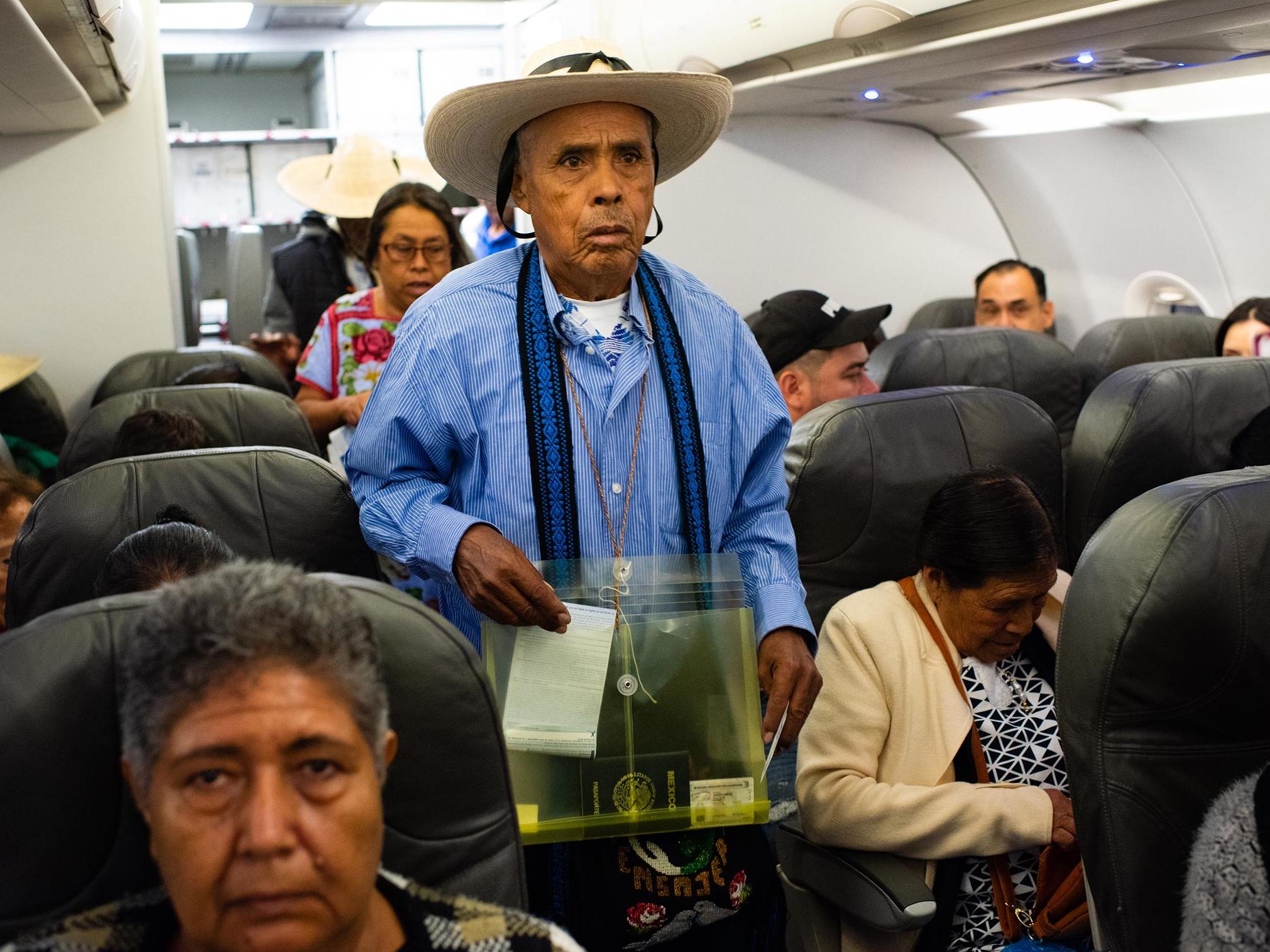
Maria Dominga Romero Leon bends over a small black suitcase and packs her things, one by one: a folder of photographs, a half-finished blouse, and a bag of wooden toys for the grandchildren she’s never met.
She sighs. “They’re probably used to America by now,” she says.
Romero Leon, 68, hasn’t seen her daughter Guillermina in so long that she’s starting to lose track of the years. Has it been 15 or 20? She isn’t sure. What she knows is that Guillermina is an undocumented immigrant in a place called Germantown in Illinois with three children of her own. Two are US citizens; one is a beneficiary of the federal programme Deferred Action for Childhood Arrivals.
Romero Leon knows that US immigration laws make it impossible for her daughter to come back to Cheran without jeopardising the life she’s built in the United States, because she doesn’t have papers to move back and forth across the border.
That’s why Romero Leon is packing her bags. She has never been on a plane, or been to an airport, or seen an escalator – she’s never left her home state of Michoacan. But now she is getting ready to fly to America.
The US government – the same government from which Romero Leon’s daughter is hiding – have surprised her with a tourist visa.
Officials in Michoacan call them palomas mensajeras (messenger pigeons). They are parents and grandparents in Mexico who have not seen their undocumented children in the United States for years, even decades.
Since 2017, officials here have been working with the US State Department to reunite those families for three-week visits in cities and towns across the United States.
For many here, it is an unlikely American olive branch amid the Trump administration’s crackdown on illegal immigration. But it’s been welcomed by immigrant families grappling with a crisis that has rippled across both countries: the elderly parents of the estimated 5 million undocumented Mexicans in the United States are dying alone in Mexico, while their children remain stuck on the other side of the border.
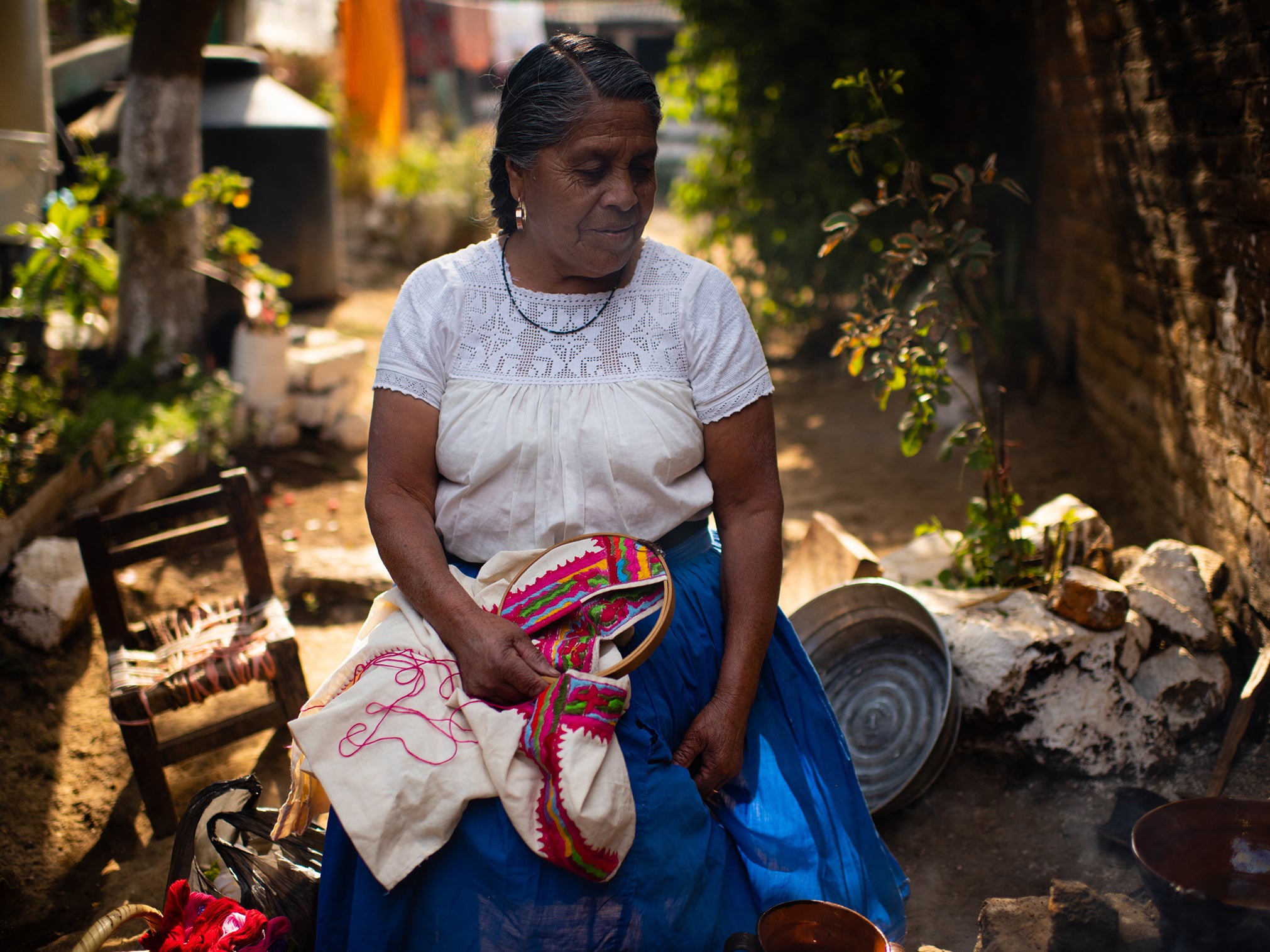
Romero Leon’s husband died of complications from diabetes a year ago. During his final days, she held a phone to his ear so their children could speak to him from the United States. Three of the couple’s six children were undocumented immigrants living across the border.
It was hard for my husband to be sick, to be dying so far away from them. I thought, will it be the same for me?
“It was hard for him,” Romero Leon says, “to be sick, to be dying so far away from them. I thought, ‘Will it be the same for me?’”
Still, when she learned that she would be joining 21 other elderly residents from around Cheran on a flight to Chicago, she found it hard to understand. Why had the United States granted her a visa? Was it a trick to apprehend her daughter?
“That’s what I’m worried about,” she says. “Are they going to use this to arrest them?”
The US government hasn’t specifically endorsed the programme, a State Department spokesperson said in a statement. But officials last year began designating special interview days at the US embassy in Mexico City for elderly visa applicants who “frequently travel in groups to the United States for a variety of reasons including tourism, cultural programmes, and to visit friends and family such as US citizen grandchildren”.
The statement made no mention of the generation between the Mexican grandparents and the American grandchildren. But in practice, the palomas mensajeras programme is exclusively for elderly Michoacanos who live in Mexico and have undocumented children in the US.
Trump – of the border wall proposal, family separations and the national emergency at the US-Mexico border – has taken a different approach towards the undocumented. “Please do not make yourselves too comfortable,” he tweeted this month, “you will be leaving soon!”
The State Department declined to answer questions about why the US is facilitating reunions between Mexicans and their undocumented children.
The department has been issuing 10 year, multiple entry visas to Michoacanos aged 60 and older who have not themselves been in the States illegally. The families pay for the visas and flights themselves.
The programme has sent more than 5,000 visitors to the US in the past 30 months.
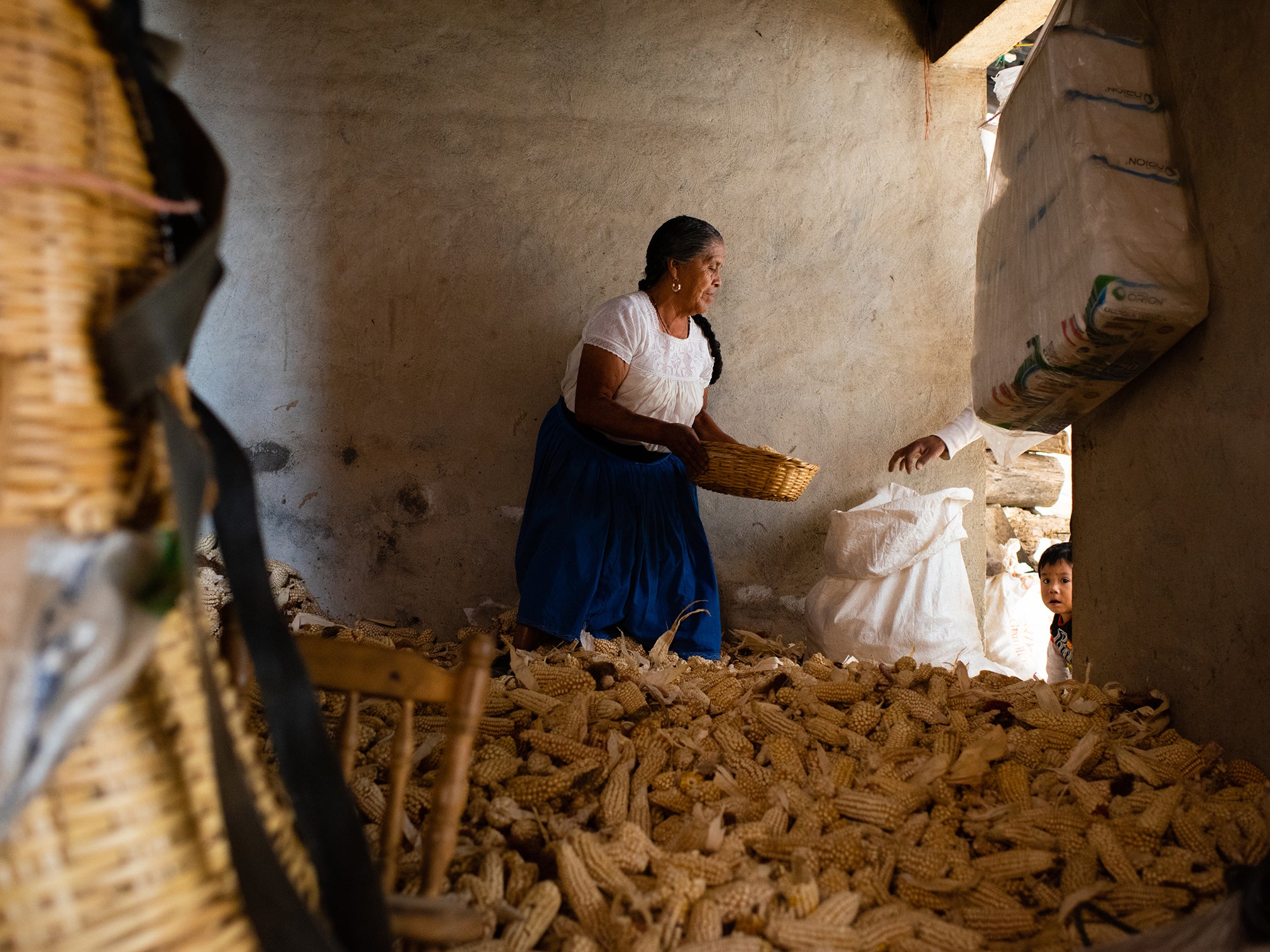
“We believe we have between 600,000 and 800,000 undocumented Michoacanos living in the United States, and this programme is for them,” says Jose Luis Gutierrez, the secretary of migration in Michoacan. “It’s a way for us to tell them they’re important to us, that we appreciate the remittances and that we care.”
Gutierrez says he met with the State Department several times leading up to the programme’s creation in 2017 and explained “the importance of what we were trying to do”.
Not a single participant has overstayed a visa, he says.
Other Mexican states have started similar programmes. In Zacatecas, it’s known as “heart of silver”. In Puebla, it’s “roots of puebla”.
Organisers warn the undocumented children not to meet their parents at the airport, where they might be asked for identification. Parents applying for visas are encouraged to list the addresses of relatives or friends who are in the United States legally, rather than provide contact information for their children illegally in the country.
Romero Leon feeds her horse Zacapa and her dog Juanito. She collects corn to sell at the local market. She tries to remember what the programme’s organisers had told her about what she can take to the US. She holds the bag of wooden toys. “Is this OK?” she asks. “And this?” indicating a clump of thread. “It’s so complicated.”
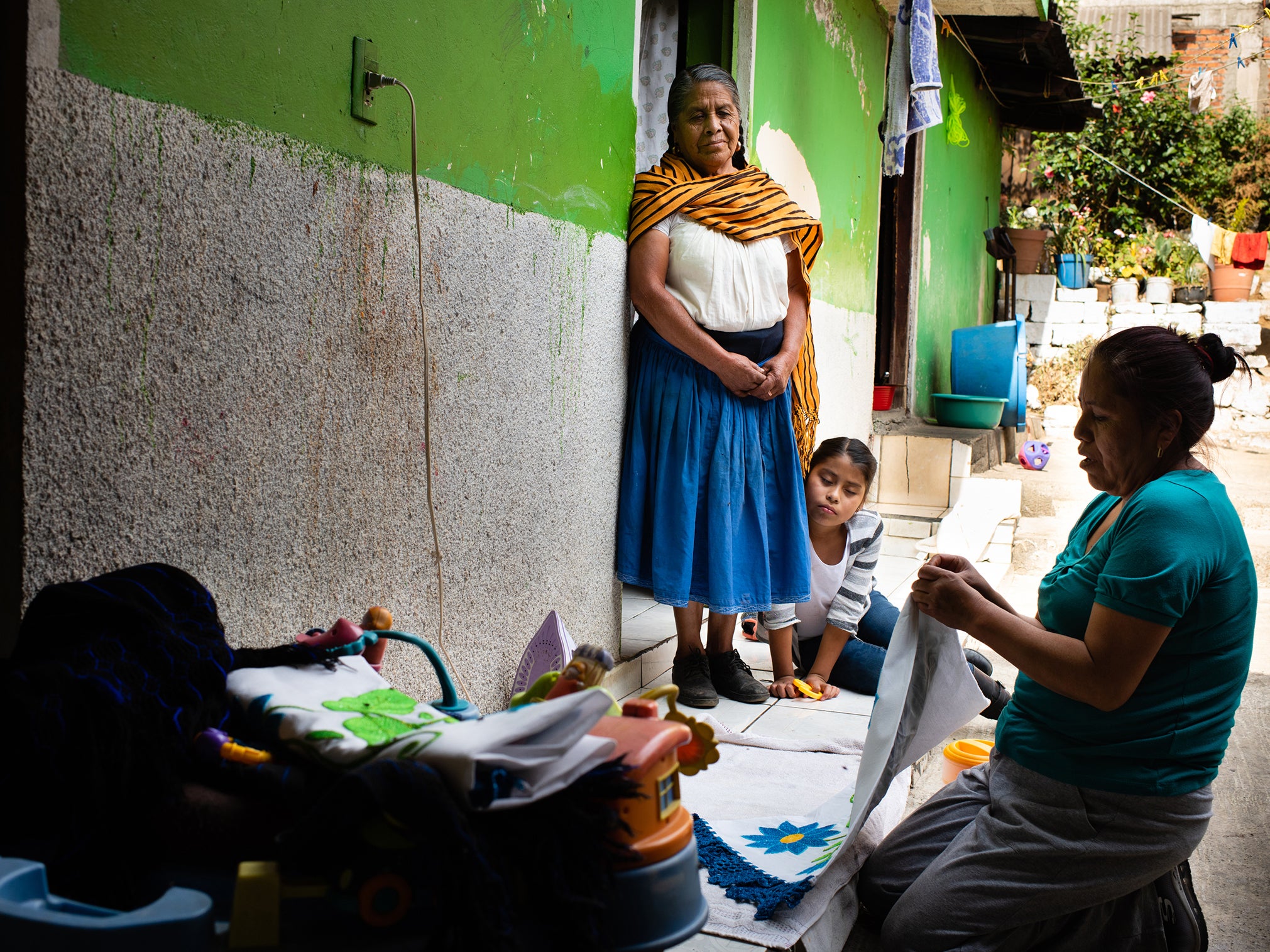
She sighs again, decides to pack only one change of clothes and zips the black bag shut. She’s still trying to make sense of the programme; to figure out what she will do with her three weeks in America.
“They say this is about reuniting families, that it’s safe for them even though they don’t have papers. But I don’t know,” she says. “I’ll tell her, ‘It’s time for you to move back.’”
I’m not mad. I understand why they stayed. There was no work here. But, still, it’s a long time
Cheran, a town of 16,000 in the hills of central Mexico, is the ancestral home of the Purepecha indigenous people. For centuries, it was an isolated dot in the state of Michoacan where the native, pre-Hispanic language was more common than Spanish.
Then, in the 1980s and 1990s, young men and women started leaving for the US – the beginning of a migration that would remake Cheran. The town lost thousands of sons and daughters, but gained millions of dollars in remittances. Suddenly it was connected to the outside world. Cherani clustered in Chicago, St Louis, Raleigh.
Guillermina Sanchez, Romero Leon’s daughter, left on New Year’s Day 2002, carrying her six-month-old daughter and a tourist visa she planned to overstay. They would reunite with Guillermina’s husband, Abdias, who had snuck across the border a few weeks earlier and was waiting in Chicago.
“They said it would be two years, and then they would be back,” Romero Leon says. “I’m not mad. I understand why they stayed. There was no work here. But, still, it’s a long time.”
She takes her black bag and begins walking to the centre of town. Every few steps she is stopped by a friend or neighbour.
“I’m going to the United States,” she tells one woman.
“I’ll tell everyone you said hello,” she promises another.
She climbs onto the bus and waves goodbye through the window. The trip organisers are now experts in shepherding the elderly travellers through international airports, translating between Spanish, English and Purepecha, holding onto passports, reassuring nervous old men and women that the plane won’t crash.
It’s late at night when Romero Leon and her 21 fellow pilgrims are guided through customs and security at the Guadalajara airport and on into the terminal.
Airport workers look at the group with curiosity.
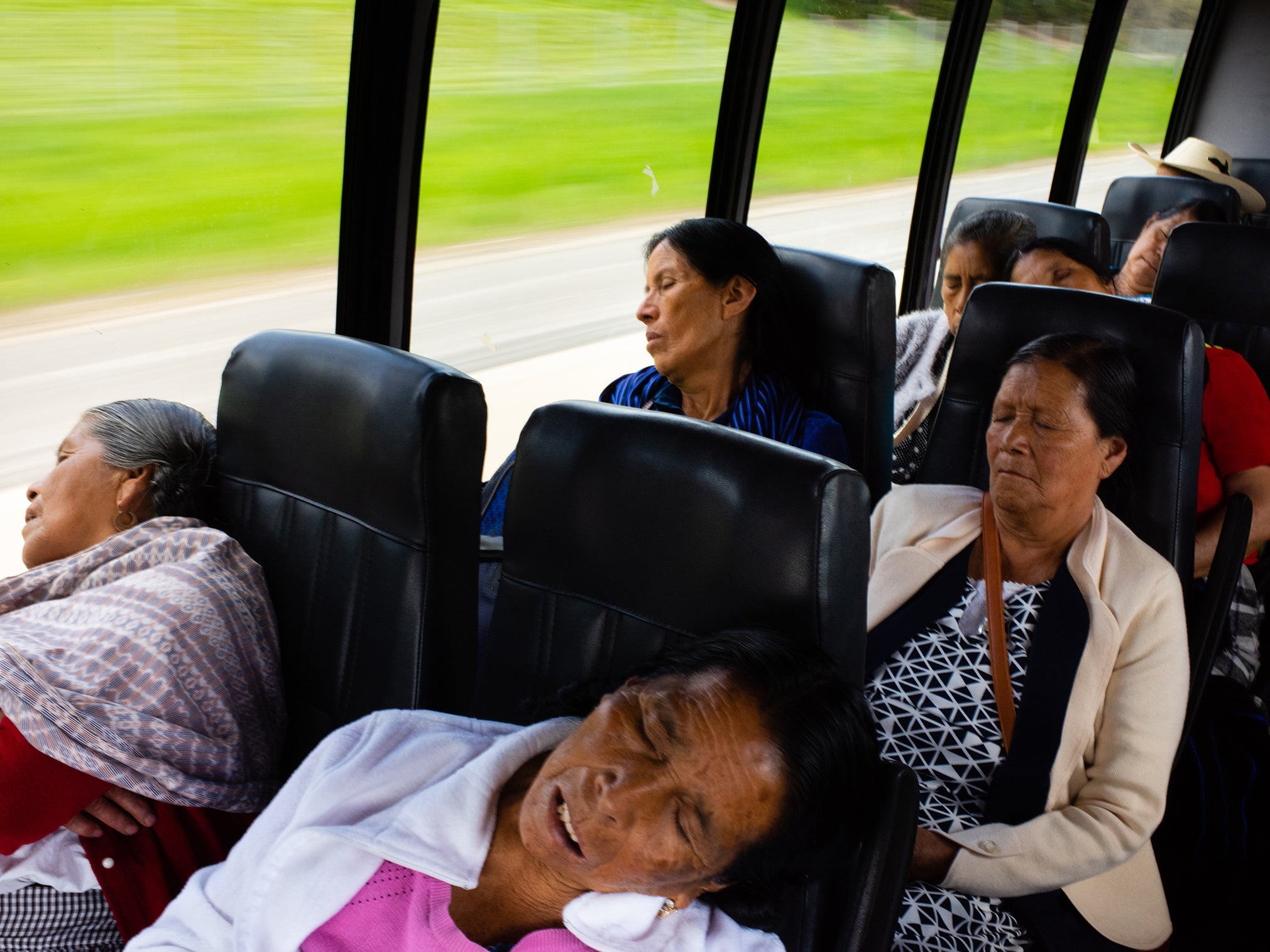
Romero Leon spots an escalator – she is bewildered. “Is it a game?” she whispers.
One woman’s bag seems about to burst. “What did you pack?” Romero Leon asks. “It’s mostly fish and cheese,” the woman says.
One man tries to imagine what it will be like to meet his grandchildren for the first time. “I’m not sure they will even be emotional,” he says, shrugging.
Romero Leon takes her place on the plane and quietly says a little prayer. The plane takes off and she falls asleep, the bag of photos and toys in the overhead compartment.
Guillermina Sanchez waits with Abdias and their children at St John the Baptist Catholic Church in Winfield, Illinois, a few miles outside Chicago.
The bus carrying Romero Leon and the rest of the group would be arriving any minute.
“Do you think we’ll even recognise her?” Chelsy Guardian, 18, Sanchez’s daughter, asks her brother Oswaldo, 13.
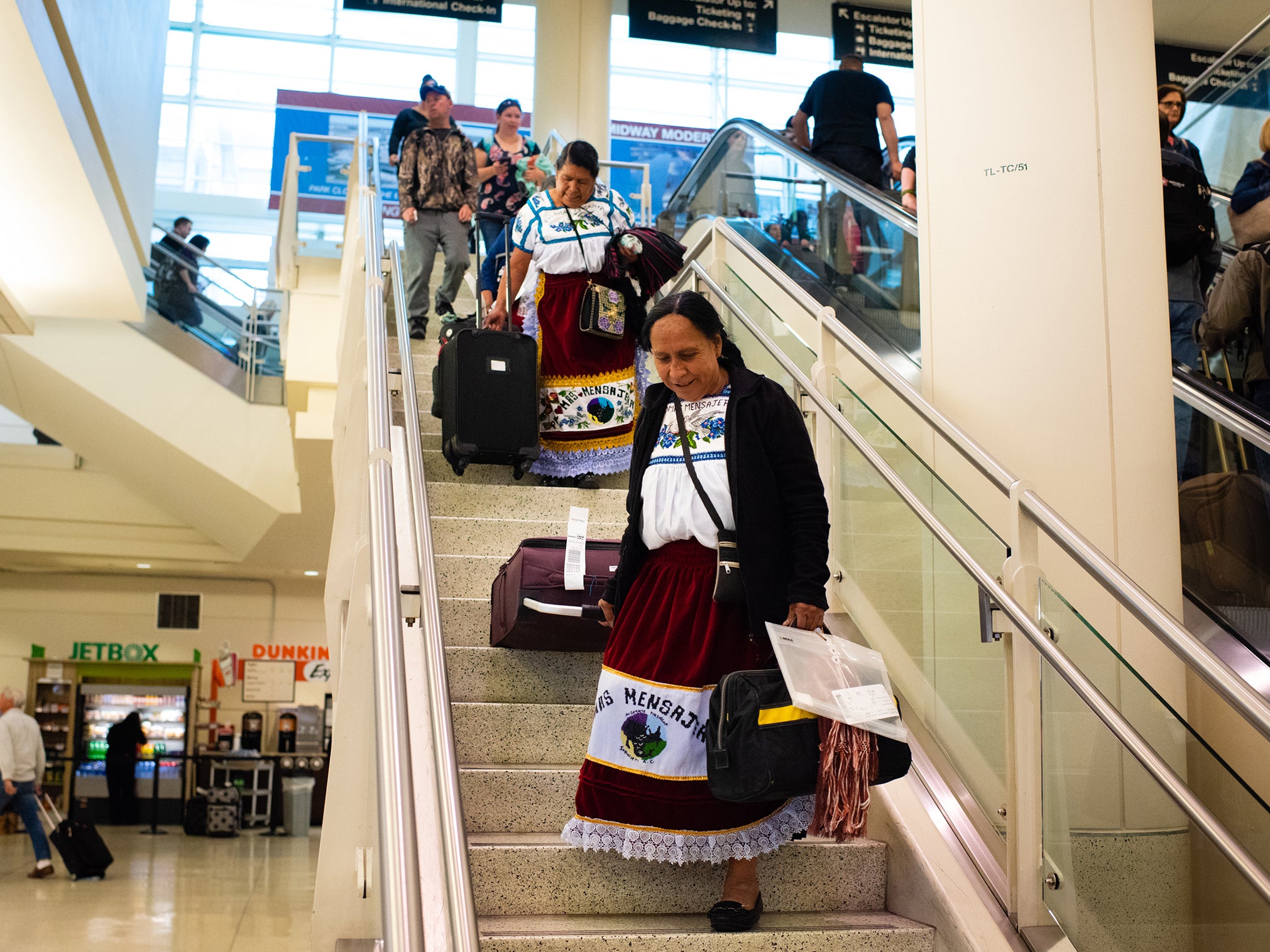
“I think so,” he says, shrugging.
These are families that haven’t seen each other for 15, 20 or 30 years. You can finally be together again
“I think it’s going to be a little awkward for a while,” Chelsy says.
When the bus pulls up to the church, she sees her grandmother through the window. “It was like seeing a mirage in the desert,” she says later.
Inside a church hall, dozens of children form a receiving line. Chelsy holds a sign: “Bienvenidos Mama Minga”.
Pedro Tomas, one of the programme’s organisers, wields a microphone like a master of ceremonies.
“These are families that haven’t seen each other for 15, 20 or 30 years,” he says. “It’s been difficult for all of you. But now you can finally be together again.”
The elderly men and women enter the hall one at a time, each looking a little confused and a little unsteady until their children and grandchildren come up and embrace them in a shock of flowers and balloons.
“Mom!” a man in his forties exclaims, his arms open wide.
“I love you so much!” a little girl tells her grandmother.
Romero Leon is one of the last to be introduced.
“I’m not going to cry,” she says. Then she walks into the room, standing up straight.
Guillermina takes her mother’s hand and pulls her close. Chelsy bursts into tears and throws her arms around her grandmother. Then Oswaldo, whose own tears flow down his face, hugs her, resting his head on her shoulder.
Guillermina thinks: “My mother has become old”.
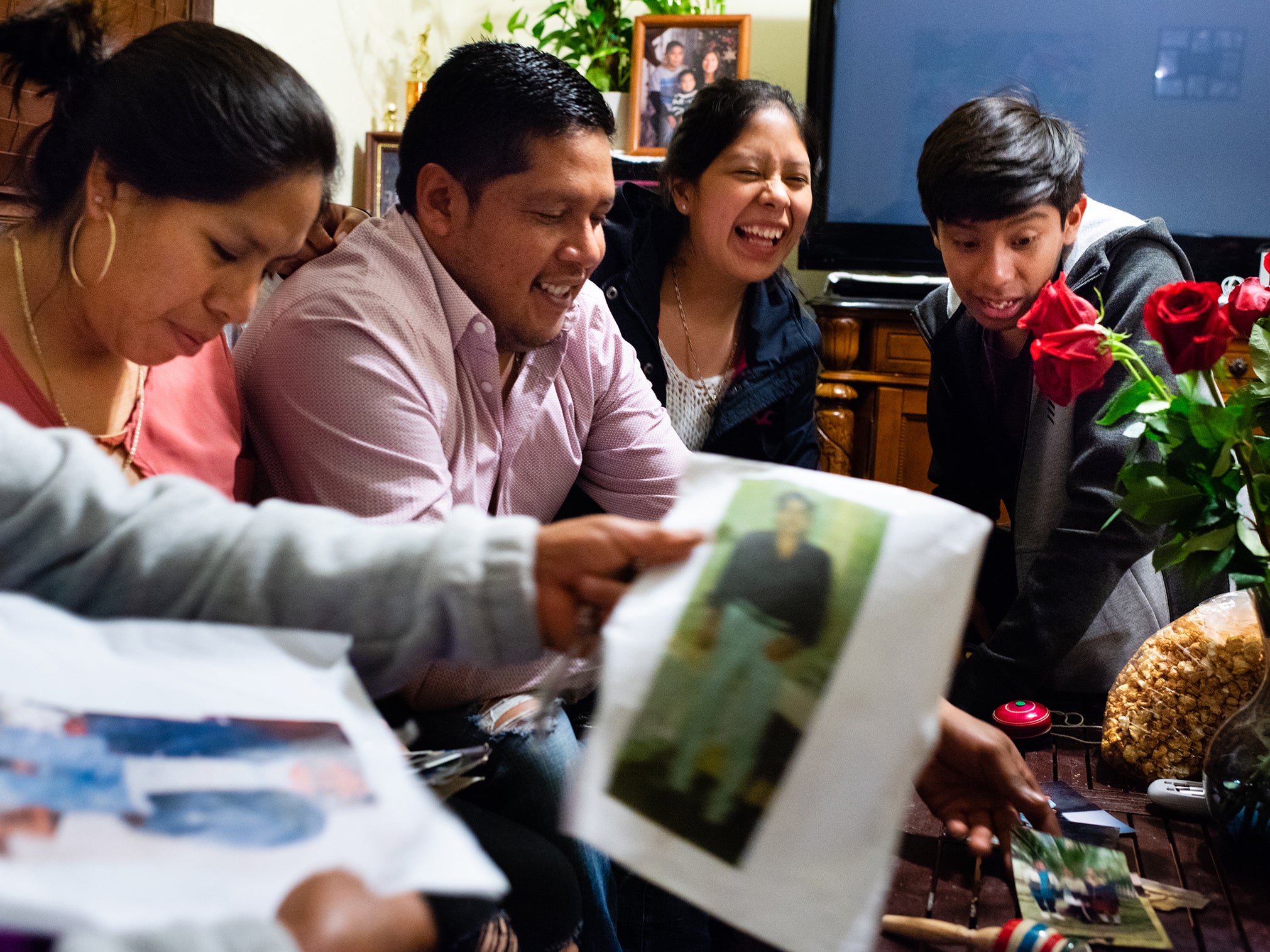
Romero Leon tries to remain in control of her own emotions. She doesn’t want her family to think she is fragile. And she worries that if she gets too emotional, it might make her sick.
But then she feels it, all at once. She covers her face with a scarf and weeps. “My daughter,” she says through tears, “my grandchildren.”
The next morning, Romero Leon’s first full day in America, she sits on the couch in front of a big-screen television in the family’s two-bedroom home, Oswaldo next to her on his iPad.
“You’ll lose an eye from looking at that,” she says, and hands out the wooden toys she’s brought from Cheran.
The family lives just off Main Street in Germantown, Illinois, a town of 1,300 outside St Louis, surrounded by farmland, its streets lined with placards bearing the names of sons and daughters serving in the military. American flags are on everything: benches, milk crates, porch swings. 77 per cent of the town’s voters cast their ballots for Donald Trump in 2016.
“Trump is a God!” the kids in Oswaldo’s seventh grade class yell. “But they don’t yell it at me,” he says, “because they know I’m Mexican.”
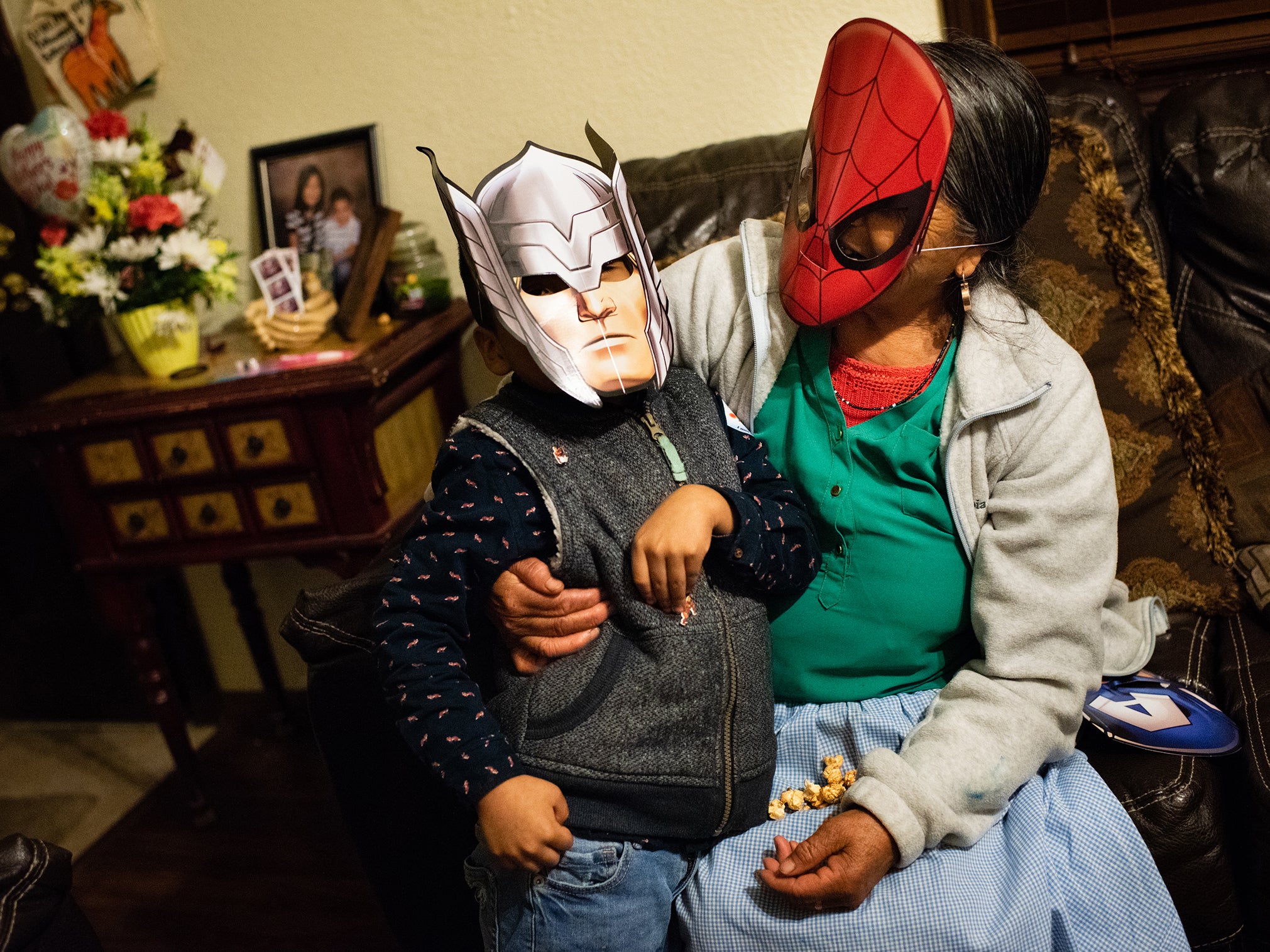
Guillermina and Abdias moved here in 2002 because it was a safe place to raise children. They found work easily – she at a plant nursery, he at a landscaping company. For a while, their children were the only Hispanic students in their schools. Oswaldo and Andrew, five, speak almost no Spanish.
Not long after they arrived here, immigration agents raided their home. The family happened to be staying with friends at the time. They hid at the friends’ house for a few days until two police officers knocked on the door.
“They told us to send Chelsy back to school,” Guillermina says. “They said they wouldn’t arrest us.”
She is carefully choosing which parts of her life to share with her mother. That is a part that she decides to keep to herself.
But a few hours later, when the family takes Romero Leon for her first visit to an American shopping mall, the issue comes up.
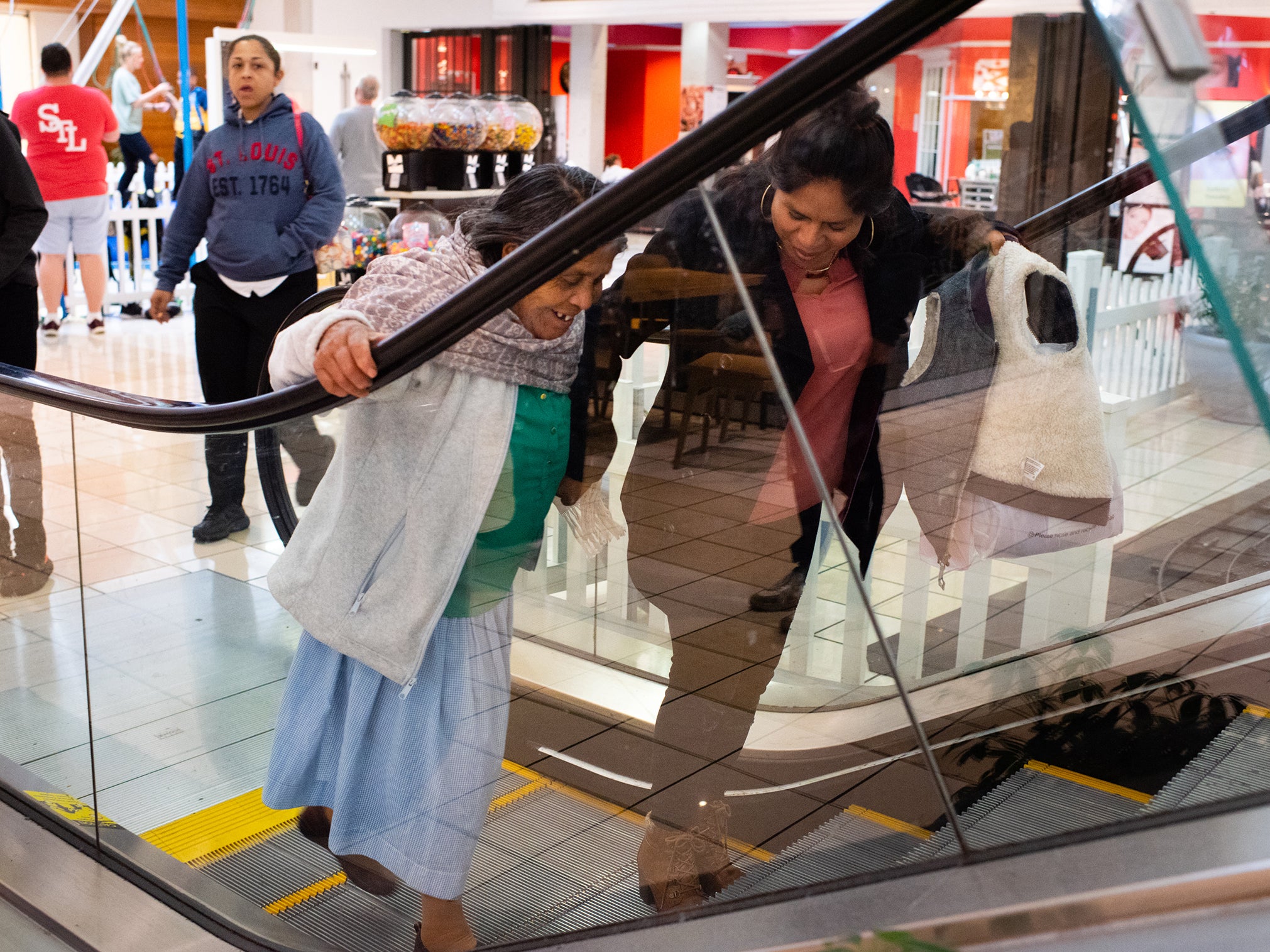
“You don’t feel like you need to hide?” Romero Leon asks.
“Over the years, we’ve become more confident, little by little,” she says.
Romero Leon has her own secret. She is planning, at some point, to push the family to move back to Cheran. She has her argument ready. It is safer there, she’ll say. They’ve already saved up and built a house in the town, and it’s sitting empty, waiting for them.
Then there’s the other obvious truth: she is getting older. “I’ll tell her that,” she says. “I’ll tell her it’s time to return.” But not yet, she decides.
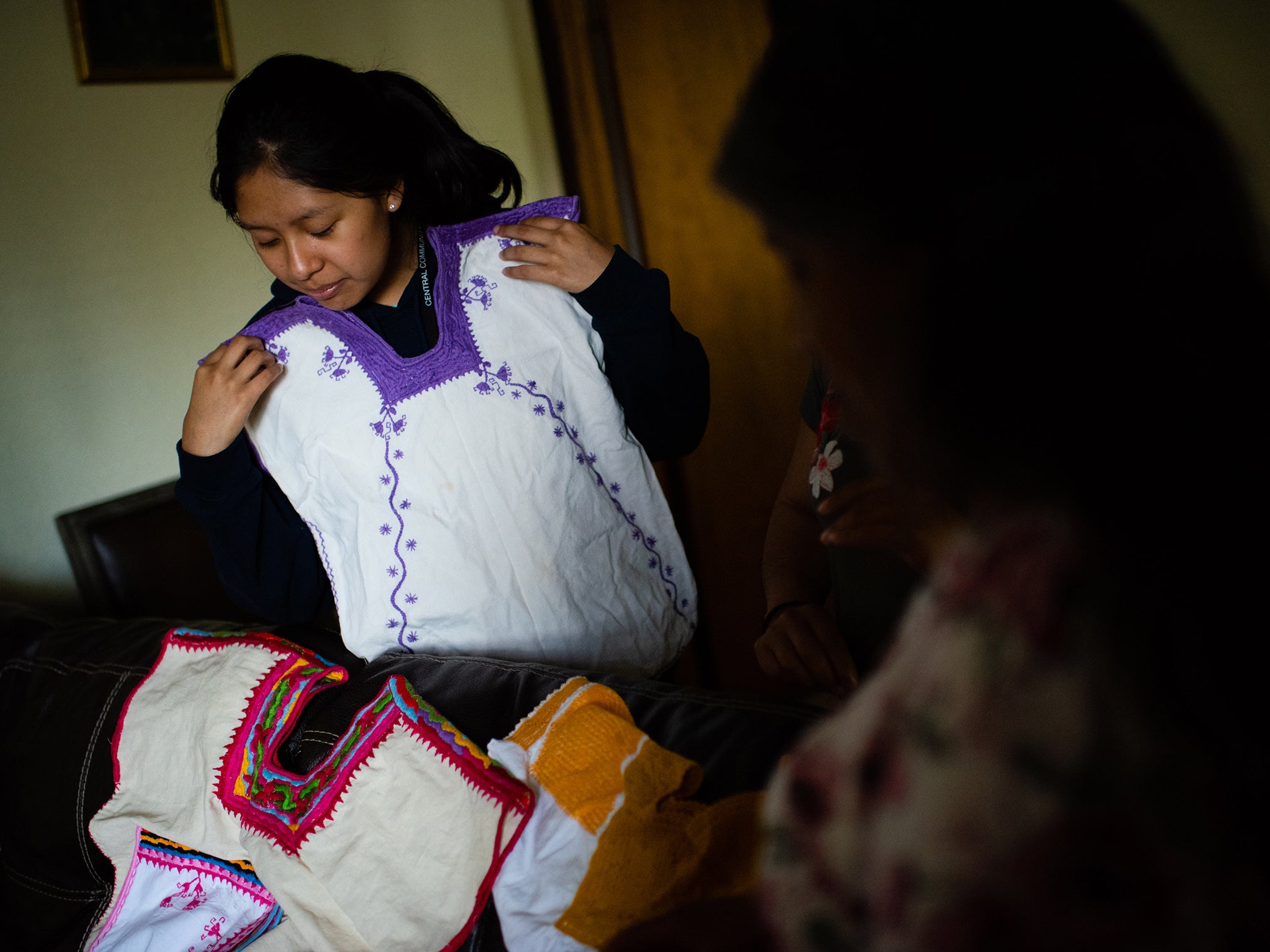
They wander around the mall, and then drive to the birthday party of Romero Leon’s five-year-old great nephew in St Louis. A clown makes balloon toys for a crowd of children. Romero Leon sits down and holds a Captain America mask to her face.
The child’s father hands the clown £200 – and Romero Leon is astonished.
“I will become a clown!” she exclaims. “I will only charge 300 pesos (£12), and I’ll ask for a little food.”
The programme books the palomas’ first visit to the United States to last three weeks. But the visas allow them to return for as long as six months in a year. In theory, they can continue to visit their families in the United States. But that often doesn’t happen.
The travel is expensive, the logistics complicated. Sometimes, the palomas are too infirm for second visits. Sometimes, one visit is enough.
It’s like they were living to see their children and grandchildren, and after that, they are ready to pass on
“What we’ve seen a lot is that the parents die soon after returning to Mexico,” organiser Joaquin Marquez says. “It’s like they were living to see their children and grandchildren, and after that, they are ready to pass on.”
Romero Leon and her family know that at some point they will have to find a way forward. Will Guillermina, Abdias and the children return to Cheran? That is the hope Romero Leon has been nurturing.
But the more time she spends in Germantown, the more she realises it will be a difficult pitch. Not only do the two youngest children not speak Spanish, but Chelsy is about to enrol in college to pursue her goal of becoming a dentist.
Romero Leon looks at the family’s three cars parked outside. On the refrigerator, there’s a newspaper article naming Chelsy student of the week; a photo of Guillermina’s basketball team; a tax form from the IRS.
“They have their lives here,” Romero Leon says.
Some of the palomas react poorly to seeing their families’ American lives up close. Romero Leon is adapting. She has five new American blouses, purchased at Macy’s, she’s found the Spanish channels on the TV. Her two sons in Pennsylvania are planning to visit soon. After quietly taking a few superhero masks from the birthday party, she plays with her grandchildren as Captain America.
Guillermina is watching her, and thinking over the family’s plans.
“There’s always been something to stop us from returning home,” she says. “First it was work. Then the kids’ education.”

She pauses, considering the newest factor in the family’s calculus. “And now that my mom has a visa, we have another reason to stay.”
© Washington Post
Join our commenting forum
Join thought-provoking conversations, follow other Independent readers and see their replies
Comments
Bookmark popover
Removed from bookmarks